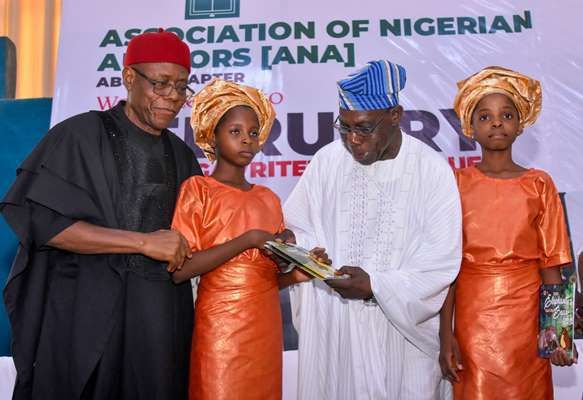
Former President Olusegun Obasanjo has expressed concern over growing the poor reading culture among young Nigerians, saying the trend could erode the nation’s literary heritage.
He stated this in his speech at the monthly ‘Reading/Writers Dialogue’ of the Association of Nigerian Authors (ANA), FCT chapter, on Saturday in Abuja.
The two-time Nigerian leader and prolific writer appeared as the guest writer for the February edition of the dialogue, with the theme,” The Writers’ Role in Nation-Building and Africa’s First Presidential Library.”
According to Obasanjo, Nigeria has, over the years, produced arrays of literary giants whose works are celebrated globally. However, there is a need to raise young writers to bridge generational gaps in the literary space.
He noted that reading was the sure pathway to becoming a writer, but many youths of today were not avid readers in spite of easy access to information and materials the internet offers.
Obasanjo lamented that if left unchecked, the trend would not only affect Nigeria’s literary landmark but also lead to the emergence of uninformed and incompetent leaders in the future.
“If you want to have writers, you must also have readers, and one of the things that you have to pay attention to is how to make our children readers, especially in this internet age.
“Many of them no longer do serious reading, and reading makes an effective and productive human being.
“A reader is a leader; a leader must not necessarily be a writer, but a leader must be a reader to be informed and know what to do.
“Nigeria is blessed with good writers who have used their craft in nation building, and one of such most distinguished authors is Chinua Achebe.
“He exposed Nigeria to the world and used his writings to elevate Nigeria’s culture, particularly his own culture,” he said.
The ex-president commended the ANA FCT chapter for championing initiatives that inspire young Nigerians to become readers and writers.
He used the opportunity to give synopses of some of his books presented at the dialogue, including “My Comma,” “This Animal Called M,” “Not My Wi,” “A New Da,” “Democracy Wor,” and “Making Africa Wor.”
Earlier, in an interview with NAN on the sidelines, Senator Shehu Sani, an author and human rights activist, lauded Nigerian authors for using their creativity to drive positive change and ensure an egalitarian nation.
“First of all, every writer reflects the reality, the season, and the climate of his own era, and by their work and intellect, put down their ideas which shape the society politically, economically, and socially.
“When you write a book, you become immortal as that book lives beyond your lifetime and will also reach places where you will never reach, meet people you will never meet in your lifetime.
“Unfortunately, we live in times today where people do not read as much as the older generation, and this could be attributed to the laziness the internet culture brought.
“The internet is a technology that provides information, teaches, and enlightens, but it has also discouraged people from researching and reading as they are supposed to,” he said.
In his speech, Arch. Chukwudi Eze, Chairman of ANA Abuja, said the association was committed to engaging young scholars through mentorship programmes that encourage them to embrace reading and writing.
According to him, the Reading/Writing Dialogue is part of the association’s efforts towards championing narratives that will usher in a better Nigeria for all.
Therefore, he commended Obasanjo for honouring the invitation and added that his presence motivated the association, especially young creative minds.
“Baba is a distinguished leader who has served Nigeria well, taken this country from being a debt nation, and made it debt free.
“His cabinet is probably the most diversified in the history of this country, and it had the largest numbers of highly skilled professionals at the top level of ministerial management.
“He is engaging as a global leader, and it is an honour to have him in our midst to share thoughts because he is also a prolific writer.
“So from the different dimensions of his background and what he has attained in government, it was important to invite him to discuss the role of the writer in nation-building”, he said.
NAN reports that the event also featured a discussion panel, spoken word and poetry, and the presentation of awards.